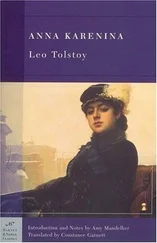“Oh, no!” she said, but he saw in her eyes a constraint that boded him no good.
“She is a very sweet, very, very unhappy, good woman,” he said. “And-Kitty-there is more!”
Again, she said, “Oh?”
“Anna Karenina, unlike Vronsky, remains one of us! She responded to the code word immediately and appropriately. I am convinced that she holds our views on the necessary changes that must come to society. Think how useful she could be…”
But Kitty hardly responded as Levin had anticipated.
“Yes, of course, her involvement is very much to be celebrated,” said Kitty coldly, when he had finished. “Whom was your letter from?”
Disappointed that his co-conspirator should take such little interest in his exciting discovery of Anna’s allegiances, he told her about the letter from Sokolov. Then, believing in her calm tone, he went to change his coat.
Coming back, he found Kitty in the same easy chair. When he went up to her, she glanced at him and broke into sobs.
“What? What is it?” he asked, knowing beforehand what.
“You’re in love with that hateful woman; she has bewitched you! I saw it in your eyes. Yes, yes! What can it all lead to? You were drinking at the club, drinking and gambling, and then you went… to her of all people! No, we must go away… I shall go away tomorrow.”
It was a long while before Levin could soothe his wife. At last he succeeded in calming her, only by confessing that a feeling of pity, in conjunction with the wine he had drunk, had been too much for him, that he had succumbed to Anna’s artful influence, and that he would avoid her. One thing he did confess to with more sincerity was that by living so long in Moscow, leading a life of nothing but conversation, eating, and drinking, he was degenerating. And in the meantime, he was hardly progressing in his efforts on behalf of the Golden Hope. If anything, telling Kitty of his one significant advance in that goal acted to dampen his wife’s zeal for the enterprise. She now seemed to feel that if resistance meant alliance with Anna Karenina, it might be best to abandon their resistance.
They talked till three o’clock in the morning, and as the hours passed the thrill he had felt about Anna, about the resistance and the Golden Hope, steadily dimmed in his breast. Only at three o’clock were they sufficiently reconciled to be able to go to sleep.
AFTER TAKING LEAVE of her guests, Anna did not sit down, but began walking up and down the room. Oh, how she missed her dear Android Karenina at such times as these, when her mind was unsettled, her soul aflutter, her thoughts muddy and indistinct. She had unconsciously the whole evening done her utmost to arouse in Levin a feeling of love-as of late she had fallen into doing with all young men-and she knew she had attained her aim, as far as was possible in one evening, with a married and conscientious man. She liked him indeed extremely, and, in spite of the striking difference, from the masculine point of view, between Vronsky and Levin, as a woman she saw something they had in common, which had made Kitty able to love both.
But what had he meant by that strange word he spoke so urgently, and how had she known how to respond to it? Her response, her understanding, had clearly resonated with him. Somehow she had known the exact right thing to say-but how? How had she known?
As one troubling thought departed another arrived, like Gravs at a station. This one was connected to Vronsky, and Anna’s growing sense of the dislocation between them. If I have so much effect on others, on this Levin, who loves his home and his wife, why is it he is so cold to me?… not cold exactly, he loves me, I know that! But something new is drawing us apart now. Here we sit in Moscow, waiting to hear of our fate. Soon we shall be proper members of this new Russian society. So why is he not here? Why wasn’t he here all the evening?
She heard Vronsky’s abrupt chime at the door and hurriedly dried her tears, and affected composure. She wanted to show him that she was displeased that he had not come home as he had promised-displeased only, and not on any account to let him see her distress, and least of all, her self-pity. She might pity herself, but he must not pity her. She did not want strife, she blamed him for wanting to quarrel, but unconsciously put herself into an attitude of antagonism.
“Well, you’ve not been dull?” he said, eagerly and good-humoredly. “You will hardly believe it, but they have smashed up all the Class Ones! All will be gone within the week. I think your husband and his compatriots mean to drain every vestige of technology from the nation-next they’ll have the Tsars back, and Russia will end up as some sort of vast agrarian monarchy, complete with horse races and peasants threshing wheat.”
He laughed, but Anna remained composed.
“Stiva has been here and Levin.”
“Yes, they meant to come and see you. Well, how did you like Levin?” he said, sitting down beside her.
“Very much.”
Anna did not mention the puzzling business with the code words. Instead she changed the subject, inquiring after Vronsky’s louche friend, Yashvin.
“He was winning-seventeen thousand, when the Toy Soldiers showed up and vaporized the tables. Some others were planning to make do with hand-carved dice, I don’t know who found them or where, when at last I got Yashvin away. He had really started home, but he went back again, and now he’s losing.”
“So what did you stay for?” she asked, suddenly lifting her eyes to him. The expression of her face was cold and ungracious. “You told Stiva you were staying on to get Yashvin away. And you have left him there.”
The same expression of cold readiness for the conflict appeared on his face too.
“In the first place, I did not ask him to give you any message; and secondly, I never tell lies. But what’s the chief point, I wanted to stay, and I stayed,” he said, frowning. “Anna, what is it for, why?” he said after a moment’s silence, bending over toward her, and he opened his hand, hoping she would lay hers in it.
She was glad of this appeal for tenderness. But some strange force of evil would not let her give herself up to her feelings; it was as though the tactics of combat they had studied together at Vozdvizhenskoe were now being turned upon one another.
“Of course you wanted to stay, and you stayed. You do everything you want to. But what do you tell me that for? With what object?” she said, getting more and more excited. “Does anyone contest your rights? But you want to be right, and you’re welcome to be right.”
His hand closed, he turned away, and his face wore a still more obstinate expression.
“For you it’s a matter of obstinacy,” she said, watching him intently and suddenly finding the right word for that expression that irritated her, “simply obstinacy. For you it’s a question of whether you keep the upper hand of me, while for me…” Again she felt sorry for herself, and she almost burst into tears. “If you knew what it is for me! When I feel as I do now that you are hostile, yes, hostile to me, if you knew what this means for me! If you knew how I feel on the brink of calamity at this instant, how afraid I am of myself!” And she turned away, hiding her sobs.
“But what are you talking about?” he said, horrified at her expression of despair, and again bending over her, he took her hand and kissed it. “What is it for? Do I seek amusements outside our home? Don’t I avoid the society of women?”
“Well, yes! If that were all!” she said.
“Come, tell me what I ought to do to give you peace of mind? I am ready to do anything to make you happy,” he said, touched by her expression of despair. “What wouldn’t I do to save you from distress of any sort, as now, Anna!” he said.
Читать дальше












